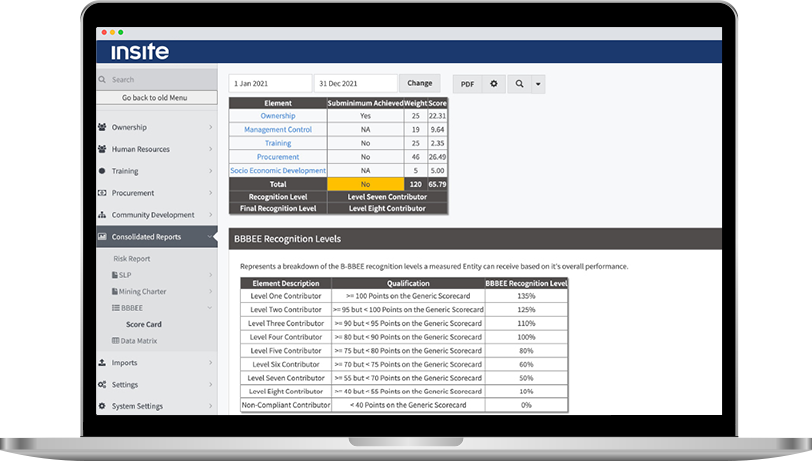Unlocking human resources data for social performance insights
Every year in mining companies across South Africa, human resources professionals are tasked with annual social compliance reporting. Extracting the human resource data needed often proves challenging due to multiple sources of social impact data that must be applied to the Social and Labour Plan, Broad-Based Black Economic Empowerment (B-BBEE) and Mining Charter Score Card reports.
With many variables to consider, human resources professionals usually rely on a reactive reporting exercise. It’s a lost opportunity in many ways. Instead of leveraging data throughout the year that can be used for social compliance decisions, the information is extracted annually in a laborious process that is difficult to reproduce year-on-year.
To address this complexity, there’s a growing demand for innovative technology solutions, such as software and system integrations. One example of an innovative solution is integrating purpose-built social compliance software with existing ERP systems. This facilitates proactive reporting and empowers stakeholders to make confident, strategic decisions throughout the year using real-time data.
In this blog, we explore the role of human resources data, challenges faced in reporting social performance, and how Insite, acQuire’s social compliance solution, can help companies make strategic decisions.
What is the role of human resources data in social compliance reporting?
To manage social performance initiatives effectively, human resources professionals need to analyse data and forecast potential scenarios in real time, such as:
- Has our local recruitment increased over time?
- Is our current workforce aligned to our planned workforce as indicated in the most recent mine economics plan?
- Will our current talent pool meet our future workforce requirements?
Your traditional human resources systems likely hold the necessary information required to answer these questions. By placing a social compliance lens on the data, your human resources teams can form strategies around how your company employs people from its local community across all occupational levels, and the percentage of employees in unskilled and semi-skilled positions.
Having access to this information ensures your mining business is well-equipped to meet its skills development targets and identify risks to the current workforce such as skills shortages, an ageing workforce and changes to mining process requirements. But if human resources teams have this information on hand, why is reporting on social performance still such a challenging process?
What challenges do human resources professionals face when reporting social performance?
As a human resource professional, you are often up against a myriad of challenges, including:
- juggling intricate workforce planning
- aligning career progression with regulatory targets
- meeting diverse reporting requirements.
Here are four challenges your human resources team may encounter when reporting on their social performance:
- Calculating the positive impact of employability on the local community
How easily can you determine whether learnerships and internships have positively impacted the employability of members from the local community? Are they represented in skilled positions? Tracking your skills development programs can be difficult. Often companies don’t have a clear view of their progress against employment equity benchmarks all year-round. - Lack of transparency in reporting processes
Managing and validating information with stakeholders against your reporting commitments can be complex and time-consuming. A lack of transparent reporting processes can result in dissatisfaction among union members and impacted communities, leading to significant social implications such as unrest in the community or operational repercussions such as work stoppages. - Tracking employee active population statistics against social compliance targets
Applying recruitment and training statistics to employment equity reporting and human resource development planning in compliance reporting can be an arduous process. If your human resources teams are manually collating and analysing this data, it may significantly affect your company’s ability to meet regulatory requirements in real-time.
- Reporting on skills development activities
Manual progress reporting for skills development activities such as bursaries, internships and learnerships for various regulatory requirements often requires duplicate administrative efforts. Streamlining your reporting efforts allows for more meaningful programs benefiting both your company and the community you operate in, in the long term.
How can your company transform their human resources data into a social performance strategy?
Companies need to be able to use data from their human resources systems to identify:
- local recruitment trends
- workforce alignment
- talent pool adequacy
- gaps between the current workforce and Employment Equity targets.
Ensuring the validity of these results is paramount. Stakeholders need to have the ability to drill down into progress reports and scrutinise underlying data fields for confidence in making informed, data-driven decisions.
By integrating your existing human resources system with a fit-for-purpose social compliance solution, you can transform raw data into visually accessible social performance insights. It helps facilitate effective communication of progress against targets to a broader audience, while also relieving administrative burdens.
How can Insite support your social performance strategy?
Insite helps equip your team with a real-time, comprehensive view of your social performance data. With Insite, human resources teams can facilitate the communication of compliance and governance obligations to stakeholders, enabling strategic decision-making year-round.
This enables human resources teams to redirect their focus toward implementing strategies, solving problems, and enhancing organisational efficiencies, guided by valuable information derived from human resources data.
Discover how Insite, developed specifically for the South African market, not only streamlines social compliance reporting but also serves as a management tool to enhance social performance initiatives.




